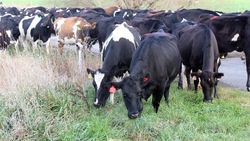NZ Herald | 2 December 2019
'Not in national interest': Ministers block foreigners from buying 4500ha of farmland
'Not in national interest': Ministers block foreigners from buying 4500ha of farmland
By Anne Gibson
In a rare rejection of an Overseas Investment Office application, Canadians have been barred from buying more than 4500ha of South Island farmland.
Mercury Agriculture LP, 92 percent controlled by Canadian interests, cannot buy more than 2000ha of South Canterbury and Otago land because it is not in New Zealand's interests, according to the office decision.
Mercury wanted to buy 2000ha at Rangitata, 1494ha near Ashburton, 816ha near Cromwell and 212ha near Temuka.
Vendors were the owners of Rangitata Dairies Limited Partnership and Rangitata GP Limited New Zealand and the price offered was withheld.
Mercury Agriculture is an investment vehicle for Fiera Comox Partners, which established a fund to buy agricultural land and rural producing assets here, in Australia, Canada and the United States, the office said.
Rangitata Dairies owns eight farms, a dairy support farm in Otago and leases farmland in Canterbury.
It intended to use the sale proceeds to convert 111ha of farmland into an orchard, for irrigation and in-shed feeding on some of the dairy farms.
But Minister for Land Information Eugenie Sage and Associate Finance Minister David Clark decided against the sale. All the land was classified as sensitive under the Overseas Investment Act because it was farmland.
Such sensitive land is identified as potentially offering substantial and identifiable benefits to New Zealand.
"For consent to be granted, ministers needed to be satisfied that the Investment would result in a substantial and identifiable benefit to New Zealand. Both Minister Sage and Minister Clark were not satisfied that the investment would result in a substantial and identifiable benefit to New Zealand," the office decision sheet said.
On November 19, Parker announced a new national interest test to the sales of most sensitive and high-risk assets to overseas buyers. Assets such as ports and airports, telecommunications infrastructure, electricity and other critical infrastructure would now be assessed through a national interest lens.
A bill on the new national interest test would be introduced early next year, Parker said.
From January to October, the office rejected six application, compared to two in the same period last year. The office approved 121 applications in those 10 months, compared to 76 in the same time last year.
Murray Horton from the Campaign Against Foreign Control of Aotearoa said it was unusual for applications to be rejected "but this Government is taking the topic of foreign investment a lot more seriously than the last Government. If they're actually starting to scrutinise applications according to the national interest test, then good.
"That means the ministers are actually applying the national interest measure. We think the natural interest test should apply not only to new applications but to operations already here," he said.
Horton cited insurance companies, Australian-owned banks and the Bluff aluminium smelter as sectors which his entity recommended be assessed "and whether those businesses being here was in this country's national interest."
The office said its pre-acceptance check resulted in around 25 percent of applications being rejected at the outset.
Horton objected to the price of the farmland being withheld and said CAFCA has complained to the Ombudsman about the office keeping that secret.














